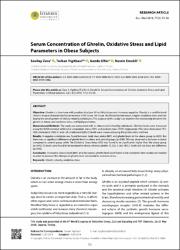| dc.contributor.author | Zora, Sevilay | |
| dc.contributor.author | Yiğitbaşı, Türkan | |
| dc.contributor.author | Ülfer, Gözde | |
| dc.contributor.author | Emekli, Nesrin | |
| dc.date.accessioned | 2021-01-26T05:37:15Z | |
| dc.date.available | 2021-01-26T05:37:15Z | |
| dc.date.issued | 2018 | en_US |
| dc.identifier.citation | Zora, S., Yiğitbaşı, T., Ülfer, G. ve Emekli, N. (2018). Serum concentration of ghrelin, oxidative stress and lipid parameters in obese subjects. European Journal of Biology, 77(2), 55-58. https://doi.org/10.26650/EurJBiol.2018.18008 | en_US |
| dc.identifier.issn | 2602-2575 | |
| dc.identifier.issn | 2618-6144 | |
| dc.identifier.uri | https://doi.org/10.26650/EurJBiol.2018.18008 | |
| dc.identifier.uri | https://hdl.handle.net/20.500.12511/6382 | |
| dc.description.abstract | Objective: Ghrelin is a hormone with peptide structure. It has fatty tissue and increases appetite. Obesity is a multifactorial chronic disease characterized by an increase in fat tissue. Fat tissue, like the endocrine organ, triggers oxidative stress and can lead to the development of obesity-related pathologies. The purpose of this study is to examine the relationship between the ghrelin in blood, and oxidative stress and lipid parameters. Materials and Methods: The study was conducted with 61 obese and 24 healthy individuals. Ghreline levels were measured using the ELISA method, while total antioxidant status (TAS) and oxidant status (TOS), triglyceride (TG), total cholesterol (TC), HDL-cholesterol (HDL-C) and LDL cholesterol (LDL-C) levels were measured using the photometric method. Results: A negative correlation was found between body mass index (BMI) and ghrelin levels in the obese group (p<0.05). But there was no significant difference of ghrelin levels in obese and control groups (p>0.05). TAS was observed to be lower in obese compared to control group, while The Oxidative Stress Index (OSI) was found to be significantly higher than the obese group (p<0.05). TG levels were found to be increased in obese; whereas ghrelin, TC, LDL-C and HDL-C levels did not show any difference (p>0.05). Conclusion: Increasing obesity level (BMI) and decreasing ghrelin level were found to be correlated. New studies are needed in order to discover the changes in ghrelin level connected to oxidative stress. | en_US |
| dc.language.iso | eng | en_US |
| dc.publisher | Istanbul University Press | en_US |
| dc.rights | info:eu-repo/semantics/openAccess | en_US |
| dc.subject | Ghrelin | en_US |
| dc.subject | Obesity | en_US |
| dc.subject | Oxidative Stress | en_US |
| dc.title | Serum concentration of ghrelin, oxidative stress and lipid parameters in obese subjects | en_US |
| dc.type | article | en_US |
| dc.relation.ispartof | European Journal of Biology | en_US |
| dc.department | İstanbul Medipol Üniversitesi, Tıp Fakültesi, Temel Tıp Bilimleri Bölümü, Tıbbi Biyokimya Ana Bilim Dalı | en_US |
| dc.authorid | 0000-0002-0675-1839 | en_US |
| dc.authorid | 0000-0003-2350-6381 | en_US |
| dc.authorid | 0000-0002-0109-5086 | en_US |
| dc.identifier.volume | 77 | en_US |
| dc.identifier.issue | 2 | en_US |
| dc.identifier.startpage | 55 | en_US |
| dc.identifier.endpage | 58 | en_US |
| dc.relation.publicationcategory | Makale - Ulusal Hakemli Dergi - Kurum Öğretim Elemanı | en_US |
| dc.identifier.doi | 10.26650/EurJBiol.2018.18008 | en_US |


















